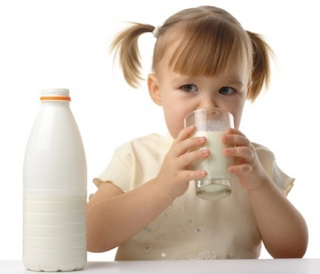Milk Allergies disease
Milk allergies are a condition of hypersensitivity to the body's immune system to the proteins contained in milk. Of all types of milk, cow's milk is the most common cause of allergies.
The incidence of milk allergies is most commonly experienced by children under the age of five. Generally, cow's milk allergy complaints do not last a lifetime. In most cases, at the age of five years, an allergic complaint can disappear on its own, as the person's immune system grows well.
Causes of milk allergies
Under normal conditions, the immune system serves to overcome germs from the outside. In a dairy allergy condition, the body considers proteins in milk like germs from outside that enter to threaten the body. The immune system then reacts excessively to the presence of the proteins.
One of the most common cases of milk allergies is allergies due to cow's milk. In cow's milk, there are several types of proteins such as casein and whey. These two types of proteins most often cause allergic reactions.
Milk Allergy Diagnosis
If a doctor suspects a milk allergy, then the doctor will take a full interview, especially on the types of food recently consumed, the symptoms experienced, and the time distance from the food consumed until symptoms arise. Also, a thorough physical examination will be conducted to determine the entire symptoms that may arise.
The doctor may also conduct an advanced examination to ensure there is no milk allergy. The examination that can be done is skin adequation inspection. The trick is a small part of the skin and exposes it with milk proteins. Then the doctor will observe in the case of skin redness or itching that appears.
Also, immunoglobulin E (IgE) Examination of the blood test is possible. If there is a tendency to milk allergies, IgE in the blood will increase in the number above normal.
Symptoms of milk allergies
The symptoms of milk allergies vary greatly, some of which can be:
- Shortness of breath
- Wheezing
- Cough
- Hoarsely
- Nausea and vomiting
- Diarrhea
- Swollen, itchy, and watery eyes
- There may also be severe symptoms called anaphylaxis. The symptoms are great shortness of breath, pale skin, bluish lips, drastic blood pressure, and decreased consciousness.
Milk Allergy Treatment
The best treatment of milk allergies is to prevent consumption of milk or dairy-based products, such as yogurt or cheese. Depending on the level of body sensitivity, food containing milk should also be avoided. Especially for those who are very sensitive to milk and its dairy products.
At the time of eating, it is good to notice the food composition that is listed on the food wrapping packaging. Sometimes it is not listed as "milk" on food packaging. But look at other materials such as casein, Lactalbumin, Lactaglobulin, or whey which may be listed in the packaging. Milk has this kind of compound. Consuming it can cause symptoms such as a milk allergic reaction.
If inadvertent milk is consumed or inevitable for consumption and allergic symptoms, the first thing that needs to be done is to ensure there are no severe allergic or anaphylactic symptoms. If it is anaphylactic, allergy sufferers must be taken to the nearest health facility and get an adrenaline injection to overcome allergies while saving the sufferer's life.
If symptoms arise as a mild symptom, anti-allergic medications such as antihistamines may be administered. Antihistamines commonly administered are cetirizine and loratadine. Also, anti-inflammatory drugs corticosteroids can be administered. Examples are dexamethasone, prednisolone, or methylene. Medications to overcome milk allergies are generally administered for at least two days.
If milk allergies are experienced by children who are still in their infancy, you should consult a doctor about the possibility of substituting the milk type. Generally, if a child is allergic to cow's milk protein, then the milk of its successor can be administered in the form of hydrolytic milk, which is partially hydrolytic milk, or soy milk.
Milk Allergy Prevention
The best way to prevent the occurrence of milk allergy symptoms is to avoid consuming milk and all foods that contain milk such as pudding, bread, cakes, pizzas, and so on.
